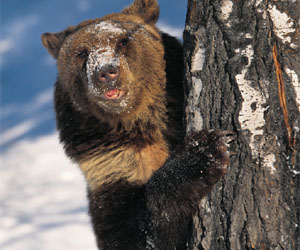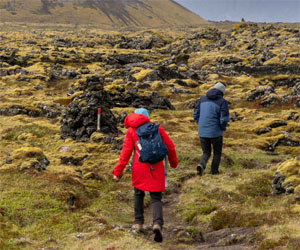


Embracing The Thrill Of Exploration

The allure of journeying into the unknown is deeply ingrained in the human spirit. From the earliest explorers who ventured into uncharted territories to contemporary adventurers pushing the boundaries of science and discovery, the thrill of the unknown has been a powerful force throughout history. This innate desire to explore, to face the unfamiliar, and to discover new frontiers is a testament to the enduring human spirit and its insatiable curiosity.
The Call Of The Unknown: The call of the unknown is a primal urge that beckons individuals to venture beyond the confines of the known world. It is a magnetic force that ignites the imagination, stirs the soul, and propels us into uncharted territory. This call transcends cultural, geographical, and temporal boundaries, unifying humanity in a shared pursuit of discovery.
Courage In The Face Of Uncertainty: Journeying into the unknown often requires courage in the face of uncertainty. Whether it's embarking on a solo backpacking expedition in a remote wilderness, conducting groundbreaking scientific research, or pursuing an unconventional career path, it demands resilience, adaptability, and the willingness to confront the unexpected.
The Thrill Of Exploration: The thrill of exploration lies in the anticipation of what lies beyond the horizon. It's the exhilaration of stepping into uncharted territory, where every moment is filled with the possibility of discovery. The unknown is a canvas upon which explorers paint their experiences, leaving behind a tapestry of memories and revelations.
Expanding Horizons: Journeying into the unknown expands horizons, both literally and metaphorically. It broadens one's understanding of the world, deepens cultural awareness, and encourages personal growth. New experiences, challenges, and encounters foster a greater appreciation for diversity and the interconnectedness of our global community.
Overcoming Challenges: Exploration often involves overcoming significant challenges. Navigating treacherous terrain, enduring extreme weather conditions, or unraveling complex scientific puzzles can be daunting. However, these challenges are integral to the journey into the unknown, serving as catalysts for growth and innovation.
Innovation And Progress: Many of humanity's greatest advancements have been the result of journeying into the unknown. Scientific discoveries, technological breakthroughs, and artistic masterpieces have all been born from the pursuit of the unfamiliar. This spirit of exploration has driven progress and innovation throughout history.
Pushing Boundaries: Journeying into the unknown is about pushing boundaries, whether they are physical, intellectual, or emotional. It involves testing limits and redefining what is possible. It encourages individuals to challenge themselves and strive for excellence.
Connecting With Nature: Exploration often fosters a profound connection with nature. Whether it involves traversing pristine wilderness, diving into the depths of the ocean, or stargazing in remote locations, the natural world becomes a source of inspiration and spiritual connection.
Creating A Legacy: The journeys into the unknown made by explorers, scientists, and pioneers have left lasting legacies. Their discoveries and achievements have expanded human knowledge, inspired future generations, and provided a lasting impact on our understanding of the world.
Journeying into the unknown is not merely an act of physical travel; it is an embodiment of the human spirit's relentless quest for knowledge, adventure, and understanding. It is a testament to the courage and curiosity that drive us to confront the unfamiliar, explore uncharted territories, and seek out the mysteries of our world. In doing so, we honor the timeless tradition of exploration and embrace the exhilaration of the unknown. So, heed the call, step into the uncharted, and embark on your own journey into the unknown, for it is in these experiences that we discover the true essence of the human spirit.
Injury Prevention Techniques For Athletes
 3. Flexibility And Stretching: Flexibility is crucial for preventing injuries. Stretching exercises improve your range of motion, making you less prone to muscle pulls and tears. Dynamic stretching before activity and static stretching after can help.
3. Flexibility And Stretching: Flexibility is crucial for preventing injuries. Stretching exercises improve your range of motion, making you less prone to muscle pulls and tears. Dynamic stretching before activity and static stretching after can help.
4. Correct Technique And Form: Proper technique and form are paramount in preventing sports injuries. Inadequate form increases the risk of overuse injuries and acute trauma. Athletes should receive coaching to ensure they perform their sport correctly.
5. Cross-Training: Engaging in multiple sports or activities can reduce the risk of overuse injuries. Cross-training allows different muscle groups to be used, preventing excessive strain on one set of muscles or joints.
6. Equipment Maintenance: Athletes should regularly inspect and maintain their sports equipment. Whether it's a bicycle, running shoes, or protective gear, keeping equipment in good condition reduces the risk of accidents caused by faulty gear.
7. Adequate Rest And Recovery: Overtraining is a common cause of sports injuries. Athletes must prioritize rest and recovery. Sleep, nutrition, and relaxation are all vital components of recovery.
8. Hydration And Nutrition: Dehydration can lead to muscle cramps and decrease your body's ability to regulate temperature.


Your Path To Slope Success
 2. Wear Appropriate Clothing: Dress warmly and in layers to stay comfortable on the slopes. Wear moisture-wicking base layers to keep sweat away from your skin, insulating layers to trap warmth, and a waterproof and insulated ski jacket and pants to protect against the cold and snow.
2. Wear Appropriate Clothing: Dress warmly and in layers to stay comfortable on the slopes. Wear moisture-wicking base layers to keep sweat away from your skin, insulating layers to trap warmth, and a waterproof and insulated ski jacket and pants to protect against the cold and snow.
3. Choose The Right Equipment: Renting skiing equipment is a practical option for novices, as it allows you to try different gear without a significant investment. Make sure your boots are well-fitted, and your skis are suited to your skill level. Ski shops and rental centers can provide expert advice.
4. Master The Snowplow (Pizza) Technique: The snowplow, often called the "pizza" technique, is the foundation for beginner skiers. To snowplow, point the tips of your skis inward, creating a wedge shape. This position slows you down and helps you control your speed. As you progress, you can start making parallel turns.
5. Learn To Turn And Stop: Turning and stopping are fundamental skiing skills. Practice turning your skis by shifting your weight from side to side, and learn to stop by bringing your skis together and applying pressure to the inside edges. These skills will give you control and confidence on the slopes.
6. Practice On Gentle Slopes: Start on gentle, beginner-friendly slopes to build your skills and confidence. Green slopes are perfect for novice skiers.
Nurturing A Connection With Nature
 The Gift Of Wildlife Encounters: Interacting with wildlife in their natural environments is a gift that transcends age, culture, and background. Whether it's spotting a rare bird perched on a branch, witnessing a bear's majestic presence in a forest, or catching a glimpse of dolphins frolicking in the ocean, these moments are cherished for a lifetime.
The Gift Of Wildlife Encounters: Interacting with wildlife in their natural environments is a gift that transcends age, culture, and background. Whether it's spotting a rare bird perched on a branch, witnessing a bear's majestic presence in a forest, or catching a glimpse of dolphins frolicking in the ocean, these moments are cherished for a lifetime.
Awe And Reverence: Wildlife encounters evoke a sense of awe and reverence for the natural world. The sheer beauty, diversity, and complexity of life on Earth become tangible and undeniable when we witness it up close. These experiences remind us of the intricate and harmonious web of life that sustains our planet.
Conservation Awareness: Wildlife encounters foster a deeper understanding of the need for conservation. Observing animals in their natural habitats, learning about their behaviors and survival strategies, and recognizing the threats they face in the modern world encourages a sense of responsibility to protect these creatures and their habitats.
Biodiversity Appreciation: Encounters with wildlife expose us to the rich tapestry of biodiversity. From the tiniest insects to the largest mammals, Earth's ecosystems are teeming with life in all its forms. Witnessing this diversity inspires a profound appreciation for the natural world's complexity.






Embracing The Thrill Of The Trail
 The heart-pounding experiences in mountain biking often begin with the sheer unpredictability of the trail. Unlike the smooth, well-paved roads of traditional cycling, mountain biking trails present riders with a dynamic range of obstacles. From rocky paths and tight switchbacks to steep drops and roots to navigate, the excitement lies in the unpredictability of each ride. It's this element of surprise that keeps the heart racing and the senses heightened.
The heart-pounding experiences in mountain biking often begin with the sheer unpredictability of the trail. Unlike the smooth, well-paved roads of traditional cycling, mountain biking trails present riders with a dynamic range of obstacles. From rocky paths and tight switchbacks to steep drops and roots to navigate, the excitement lies in the unpredictability of each ride. It's this element of surprise that keeps the heart racing and the senses heightened.
One of the most thrilling aspects of mountain biking is conquering challenging terrains. Riders push themselves to their limits, testing their endurance and technical prowess. The climb up a steep hill can be grueling, but the sense of accomplishment at the summit is unparalleled. Descending down a rocky slope with precision and control is a heart-pounding experience that combines fear and excitement, often resulting in an adrenaline high.
 Understanding The Basics: Mastering the art of outdoor adventure begins with understanding the fundamentals. Start by learning essential outdoor skills, such as navigation, first aid, and wilderness survival. These skills are your foundation, providing the knowledge and confidence you need to thrive in the great outdoors. Take courses or workshops, read books, and practice these skills until they become second nature.
Understanding The Basics: Mastering the art of outdoor adventure begins with understanding the fundamentals. Start by learning essential outdoor skills, such as navigation, first aid, and wilderness survival. These skills are your foundation, providing the knowledge and confidence you need to thrive in the great outdoors. Take courses or workshops, read books, and practice these skills until they become second nature.
Gear And Equipment: Choosing the right gear and equipment is crucial for any outdoor adventure. Invest in high-quality gear that suits your specific activities, whether it's hiking, camping, kayaking, or rock climbing. Proper equipment enhances your safety, comfort, and overall experience. However, keep in mind that more gear doesn't always mean a better adventure. Learn to pack efficiently and carry only what you need to minimize your environmental impact.
Leave No Trace: One of the most important aspects of mastering outdoor adventure is practicing Leave No Trace principles. Leave No Trace is an ethical framework that encourages responsible outdoor recreation. It involves leaving natural areas as you found them, minimizing human impact on the environment. This includes packing out all trash, respecting wildlife, and staying on designated trails. By following these principles, you contribute to the preservation of our wilderness areas for future generations.
Fitness And Conditioning: Outdoor adventures often demand physical and mental stamina. Regular physical conditioning is essential for mastering the art of outdoor adventure. Train your body for the specific activities you plan to undertake. Build strength, endurance, and flexibility. Additionally, mental fortitude is equally important. Prepare yourself to face challenges, adapt to unexpected situations, and stay calm under pressure.